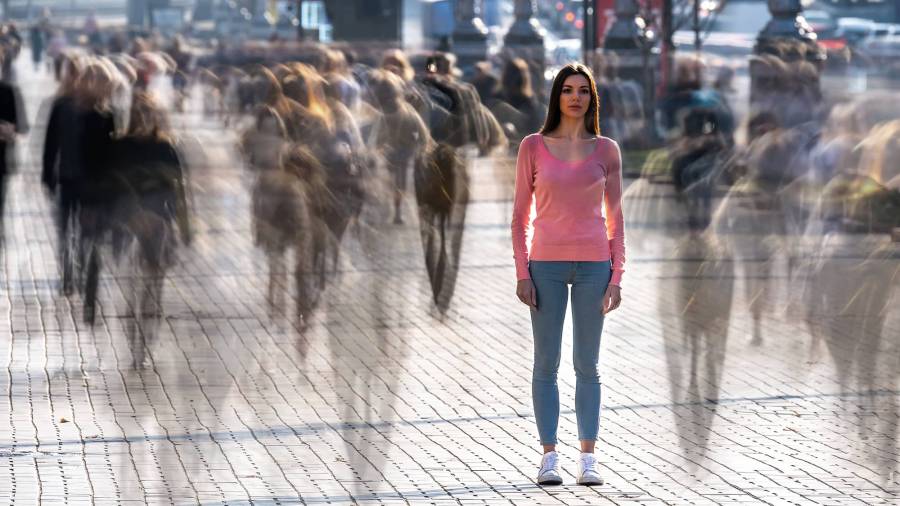Hypnosis for Agoraphobia
Fear of Public Places
Fear is an important human instinct that serves a purpose - it helps us avoid pain and is meant to ensure our survival. When we are in situations that trigger intense fear, our body releases adrenaline, the fight or flight response is activated, our senses sharpen and the heart begins to work very hard to accelerate blood circulation - causing rapid heartbeat. When intense fear or panic attacks in the absence of real threats are repeatedly activated, the fear instinct is no longer serving us or helping our survival. For those affected by agoraphobia, the suffering caused by their states of panic is much greater than the ability of the fear to prevent the perceived threat. Hypnosis is an effective tool to rewire the fear associations and teach the mind and body how to stay calm and recognize when fear is the appropriate response. Learn more about agoraphobia and our treatment methods below.

Image: Hypnosis for Agoraphobia - Fear of Public Places
Agoraphobia symptoms
How to tell if you have agoraphobia - the fear of having no escape or losing control
Agoraphobia is a state characterized by perceiving the environment as unsafe with no easy escape. Triggering spaces and situations may involve crowds, public transit, shopping centers, planes, elevators and open spaces. Those affected by agoraphobia may choose to withdraw socially and start avoiding public events altogether. This can restrict life and significantly lower the quality of life for those with agoraphobia.
Agoraphobia presents itself through various physical and psychological symptoms:
Agoraphobia presents itself through various physical and psychological symptoms:
Physical Symptoms
Physical symptoms of agoraphobia include rapid heartbeat, nausea, dizziness, sweating, cold/hot flashes and shortness of breath. Furthermore, shaking or trembling, chest tightness, fainting and loss of bladder control may occur during a panic attack. The physical tension during triggering events can be intense, which can lead to exhaustion and fatigue after an episode.
Psychological Symptoms
Affected individuals often experience high levels of psychological distress and describe fear of losing control, fear of not being able to escape, embarrassment, derealization (feeling disconnected from the environment and reality), fear of not getting help, fear of fainting, fear of having a panic attack, fear of dying as well as fear of not being able to control bladder and bowel movements. Beyond an acute episode, some thoughts and anxiety form as a type of after-effect. Circling thoughts ("what if it happens again?"), shame, insecurity and feelings of powerlessness ensue, followed by avoidant behavior and social withdrawal.
Hypnosis for agoraphobia
Our experience with many years of hypnotherapy has shown that hypnosis is an extremely effective method of choice for fears and phobias, including agoraphobia. Hypnosis treats fear by starting a conversation with the subconscious. Through visualizations and sensory simulations, we can create positive, alternative associations for what would normally be fear-inducing situations through hypnotic trance
Agoraphobia self test
Do I suffer from agoraphobia?
The following questions might help you find out whether you are experiencing agoraphobia:
-
1
Are you afraid of crowds or public places? -
2
Do you avoid changing locations, traveling far from home, or traveling alone? -
3
Do you avoid travel, even if it puts you at a professional or personal disadvantage? -
4
Have activities such as going to the movies, parties, or concerts been things that you avoid? -
5
Do you avoid important situations in everyday life or at work where you think escape can be difficult? -
6
Do you reduce social contacts to avoid certain situations or places? -
7
Do you have panic attacks, rapid heartbeat, sweating, or dizziness when you think escaping a certain place is difficult?
If you can answer yes to most of these questions and feel restricted in your daily life, you should seek therapeutic advice. You may have agoraphobia. Please note that questions are always asked broadly, so it is possible that individuals who are not affected by agoraphobia may also receive a positive result. Not everyone who feels uncomfortable in a crowd or prefers not to travel too far suffers from agoraphobia.
Agoraphobia facts
Where and when does agoraphobia occur?
Agoraphobia typically occurs in specific situations. Affected individuals feel intense fear at the thought of being unable to escape or flee. These situations can occur when they are in crowds, public places, public events, concerts, movies, elevators or even at the hairdresser.
The fear of public places and the fear of losing control
Agoraphobia is often categorized as an anxiety disorder. Those affected by agoraphobia and anxiety disorders often experience panic attacks, which can significantly impair the overall quality of life. However, it might be good to keep in mind that anxiety disorders occur much more frequently than we think - so even though you may feel alone in your condition, there are many people experiencing conditions like agoraphobia.
15.4 %
Anxiety disorders are among the most common mental illnesses.
Anxiety disorders are among the most common mental illnesses.
25 %
of all people suffer from anxiety disorders at least once in their lives.
of all people suffer from anxiety disorders at least once in their lives.
37 %
of respondents cite stress/hectic everyday life as among the biggest triggers for mental health problems.
of respondents cite stress/hectic everyday life as among the biggest triggers for mental health problems.
Source Statista:
Own representation, data source: https://de.statista.com/ Question/title: proportion of population with anxiety disorders (lifetime prevalence) Source Expert(s) (Kessler), Survey by Expert(s) (Kessler), Published by Focus, Reference to source Focus 14/2011, 04. 04/2011, page 86, publication date April 2011, accessed 11/13/20
Own presentation, data source: https://de. statista.com/question/title: prevalence of selected anxiety disorders among children and adolescents in Germany by gender in 2017, source DAK, survey by DAK, published by DAK, source reference, DAK - Kinder- und Jugendreport 2019, page 134, publication date, November 2019, accessed 13. 11.20
Own representation, data source: https://de.statista.com/ question/title: The biggest triggers for mental health problems, source: Statista Global Consumer Survey, accessed 11/13/20
Own representation, data source: https://de.statista.com/ Question/title: proportion of population with anxiety disorders (lifetime prevalence) Source Expert(s) (Kessler), Survey by Expert(s) (Kessler), Published by Focus, Reference to source Focus 14/2011, 04. 04/2011, page 86, publication date April 2011, accessed 11/13/20
Own presentation, data source: https://de. statista.com/question/title: prevalence of selected anxiety disorders among children and adolescents in Germany by gender in 2017, source DAK, survey by DAK, published by DAK, source reference, DAK - Kinder- und Jugendreport 2019, page 134, publication date, November 2019, accessed 13. 11.20
Own representation, data source: https://de.statista.com/ question/title: The biggest triggers for mental health problems, source: Statista Global Consumer Survey, accessed 11/13/20
Agoraphobia causes
Causes of the fear of public places
According to studies, every seventh German suffers from agoraphobia at least once in their life. The causes involve certain ways of thinking and a strong sensitivity to the environment. Past experiences, trauma or severe stress can also lead to agoraphobia and other anxiety disorders. When affected individuals learn that they can avoid fearful situations through avoidance strategies, they will start to utilize avoidance as their main coping mechanism. This can lead to social withdrawal, isolation and social anxiety. In the worst case, everyday activities such as shopping become an almost unsolvable problem for the person concerned. Hypnotherapy gets to the roots of phobias and helps to process the triggers effectively. Hypnosis Berlin is here to support you in tackling agoraphobia.
Agoraphobia consequences
What can be the consequences of agoraphobia, the fear of places?
When agoraphobia remains untreated, the consequences and secondary conditions that develop can be alarming. In addition to fearing something like public places, it might become increasingly difficult to leave the house at all, to be alone, to be in a car, train or plane. For many,the very thought of being far from home is already associated with anxiety.
Some of the consequences of agoraphobia include:
Some of the consequences of agoraphobia include:
- Various forms of avoidance strategies
- Isolation - life increasingly takes place within the confines of home.
- Problems in the professional environment, sometimes leading to unemployment.
- Affected individuals might undergo many medical examinations in the belief that the agoraphobia is a symptom of an undiagnosed illness.
- Significant behavioral changes due to prolonged periods of isolation - social skills might deteriorate.
- Increased health risks due to "self-medicating" with alcohol or other drugs.
Agoraphobia and secondary conditions
Agoraphobia can lead to a variety of secondary conditions. These may include depression, generalized anxiety disorder, panic disorders and suicidal thoughts. Additionally, the intense stress caused by the condition can compromise the immune system and cause psychosomatic complaints like stomach aches, headaches, muscle tension and sleep disorders.
Agoraphobia with or without panic disorder?
Agoraphobia with panic disorder
If this fear is additionally accompanied by regular panic attacks, which can include rapid heartbeat, shortness of breath and dizziness, we are speaking of agoraphobia with panic disorder. Anyone who has ever suffered a panic attack in a crowded place or even in a stadium knows how terrible such a thing is. Such an event can mark the subconscious much like a trauma does, and with every panic attack the fear becomes greater and more justified to the affected individual. Hypnosis Berlin helps to break the cycle through intensive hypnotherapy treatments.
Agoraphobia without panic disorder
Agoraphobia can also occur without panic attacks. About half of those who suffer from panic disorder also have agoraphobia. At the same time, those who suffer from agoraphobia have fears that can intensify to the point of a panic attack, which often makes it difficult to make a strict distinction. Agoraphobics are afraid of large spaces and many people, as already described above, and describe the feeling of fear in varying degrees of intensity - from mild anxiety and discomfort to a panic attack. In contrast, panic attacks in panic disorder often occur for no apparent reason.
Agoraphobia hypnosis treatment
About the effectiveness of hypnotherapy for agoraphobia.
In a study conducted by the University of Constance in 2006, it was proven that hypnosis is extremely effective, especially for phobias. While in the control group only 26.54% of those affected experienced an improvement in their symptoms, the figure for patients treated with hypnosis was 73.56%. The treatment begins with learning a relaxation technique, which is important for the hypnotic trance. Already this relaxation technique has a high added value for the patient, which is also noticeable outside the hypnosis session. In the further course of the hypnosis it is now a matter of recognizing the triggering moment and reinterpreting it very slowly. The patient uncovers this process through the subconscious, which contains important inner resources that are activated through hypnosis. Through the support of the hypnotherapist, clients can retrieve the fear-triggering situations and defuse them through autosuggestion. You can find out more about our methods by navigating through our website and going through the FAQ.
Agoraphobics and the fear of hypnosis
One more thing should be mentioned specifically about the fear of losing control. Especially individuals who suffer from agoraphobia with panic disorder can be afraid of going to a hypnotherapist. They might associate hypnotherapists to so-called stage "hypnotists" - someone hypnotizing people against their will in a circus tent. Apart from the fact that in hypnosis you will never do something against your will, professional hypnotherapy should not be confused with stage hypnosis. After all, hypnotherapy is a form of psychotherapy - and its aim is to help an individual. If we cannot help our clients, there is no point in our profession. At Hypnosis Berlin we offer an in-depth conversation where you will have lots of space to address concerns before carrying out the hypnosis. We will provide you with a safe space, a lot of time, calmness and above all empathy. You can find more information about the process of hypnosis in my practice under Hypnosis Berlin - Procedure.
More Information
Hypnosis Appointment Booking
The first hypnosis session usually lasts 120 minutes and includes getting to know each other, a detailed anamnesis and your first hypnosis.
After booking an appointment in the online calendar, you will receive detailed information about your hypnosis session by email and will receive the hypnosis e-book free of charge when you book the first session. Follow-up appointments usually last 90 - 120 minutes, depending on the current situation and the resulting needs.
You can find detailed information about the prices under Hypnosis Prices.
After booking an appointment in the online calendar, you will receive detailed information about your hypnosis session by email and will receive the hypnosis e-book free of charge when you book the first session. Follow-up appointments usually last 90 - 120 minutes, depending on the current situation and the resulting needs.
You can find detailed information about the prices under Hypnosis Prices.
Smaller topics and issues can sometimes be solved in one session. In particular, hypnosis for smoking cessation takes place in one intensive session. More complex issues that accompany people longer are treated in four sessions on average. Hypnotherapy is to be understood as a short therapy. There are also exceptions where I support clients over several years at their express request.
Usually clients come for a follow-up appointment at an interval of 1 to 4 weeks. I have had very good experiences with a session interval of 1 to 2 weeks. I would like to emphasize here that in my experience this depends on the topic and the client.
Under the following link you can select and book your appointment yourself in the online calendar: Make an Appointment.
You will receive an invoice for each session. This does NOT show any fee codes of the GebüH and does not contain any diagnoses. The session is to be paid privately at the end of the session in cash or with EC card. The practice does NOT bill public and private insurances.
You can find more questions and answers in the
Hypnosis FAQ section - frequently asked questions about hypnosis.
Frequently asked Questions
How can I tell if I was in trance?
Many people who have experienced hypnosis and trance describe the state as one that is similar to the feeling just be...
What are the advantages of Hypnosis Berlin?
These are the advantages of hypnotherapy at our Hypnosis Berlin Practice
The advantages of hypnosis are numerous. T...
How effective is hypnosis and are the effects long-lasting?
Is hypnosis effective in the long term or do the old behavior patterns come back?
Hypnosis is a highly effective tre...
How fast does hypnosis show its effects?
How quickly does hypnosis show an effect?
Hypnosis refers to communicating with the unconscious parts of the human b...
Similar Hypnosis Topics:
You can find more information about hypnosis and our hypnotherapy sessions in the FAQ section and more specifics about the hypnotherapy procedure here.
 Children
Children Phobias
Phobias Physical
Physical Profession
Profession Psychosomatic
Psychosomatic Relationship
Relationship Self-Growth
Self-Growth Stress
Stress





